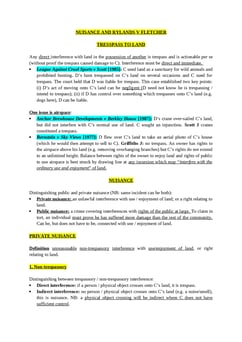Cocking v Eacott [2016] EWCA Civ 140
Judgement for the case Cocking v Eacott
Table Of Contents
KEY POINTS
A landlord can be liable for a nuisance caused by their tenant on the ground of the Sedleigh-Denfield principle under certain circumstances. Liability may arise if the landlord has expressly or implicitly authorised the tenant's actions or if the landlord has actively participated in creating the nuisance.
FACTS
Mr. and Mrs. Cocking, who live in a terraced Victorian house next to a property, have complained about a barking nuisance caused by Ms. Eacott, the occupant of the adjoining property. Ms. Eacott had been granted a bare licence to live at the property by her mother, Mrs. Waring, who paid all the bills and maintained the property.
Despite an estrangement between Mrs. Waring and Ms. Eacott, Mrs. Waring was aware of the complaints made by Mr. and Mrs. Cocking about the nuisance. In response to the complaints, Mrs. Waring wrote a letter defending her daughter and making counter-allegations against the complaining neighbours.
Mr. and Mrs. Cocking's solicitors sent a letter before action to Mrs. Waring, but she rejected the claim, asserting that a landlord is not liable for a tenant's nuisance. Proceedings were eventually issued and Mrs. Waring served a notice to quit on her daughter. Thereafter, she obtained a possession order for the property, although she did not enforce it.
The case centres on the alleged nuisance caused by Ms. Eacott, and the legal question involves the liability of a landlord for a tenant's nuisance.
COMMENTARY
This case emphasises the duty of landlords to take complaints seriously and respond appropriately to mitigate any nuisance issues caused by their tenants.
The case also provides clarity on the scope of a landlord's liability in nuisance claims and highlights the importance of maintaining harmonious relations between neighbouring properties.
RELATED CASES
For Further Study on Cocking v Eacott
Need instant answers? Our AI exam tutor is here to help.
Ask questions 🙋 Get answers 📔 It's simple 👁️👄👁️
Our AI is educated by the highest scoring students across all subjects and schools. Join hundreds of your peers today.
Get StartedSimilar Cases
Related Product Samples
These product samples contain the same concepts we cover in this case.
| Tort Law | Nuisance Notes (70 pages) |

